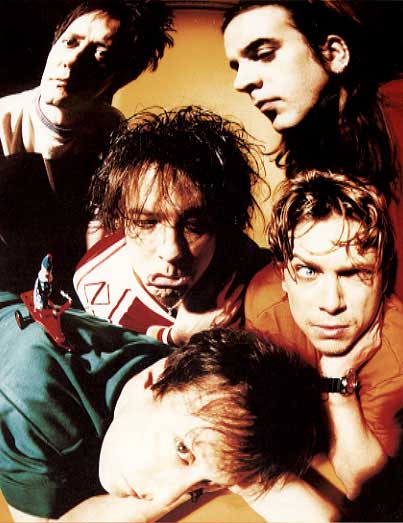|
Formed 1976, Crawley, England and dubbed the "masters of mope rock," the Cure rose from Britain�s late-Seventies punk scene to become one of the biggest-selling "underground" acts of the Eighties. Frontman Robert Smith, who has been described as the "messiah of melancholy" and the "guru of gloom," is known for wearing death-white facial makeup, crimson lipstick, and teased black hair; he is rivaled only by Morrissey as a heartthrob for the discontented. The Cure�s goth-pop style is characterized by self-obsessed lyrics, minor-key melodies, and Smith�s vexatious whine. Robert Smith grew up in working-class Crawley, Sussex, a suburb of London. He recalls his childhood years as difficult, a time of run-ins with his parents and the law. At 17 he formed the Easy Cure with childhood friends Laurence Tolhurst and Michael Dempsey as a sort of catharsis for his feelings of frustration. The group�s music has remained therapeutic for Smith. The Cure made its initial splash in the U.K. with the 1979 single "Killing an Arab," which stirred controversy when it reappeared on the mid-Eighties retrospective, Standing on a Beach: The Singles. Some U.S. radio DJs used the song, which was inspired by Albert Camus� The Stranger, to advance anti-Arab sentiments; the group included a disclaimer with subsequent pressings stating that the song "decries the existence of all prejudice and consequent violence." The Cure�s music evolved from the sparse punk pop of that song and other early singles, including "Boys Don�t Cry" and "Jumping Someone Else�s Train," to the dirgy, moody music of Faith and Seventeen Seconds, to the more focused hits on the later albums Kiss Me, Kiss Me, Kiss Me, Disintegration, and Wish. While the Cure had been a top hitmaking indie band in the U.K. since the early Eighties, it wasn�t until the release of Standing on a Beach (and its CD-only counterpart, Staring at the Sea) (#48, 1986) that the band moved beyond its cult status in the U.S. Kiss Me, Kiss Me, Kiss Me (#35) debuted in June 1987, spawning the minor hits "Why Can�t I Be You?" (#54, 1987), "Just Like Heaven" (#40, 1987), and "Hot Hot Hot!!!" (#65, 1988). In 1989 Disintegration reached #12 and included the group�s biggest hit yet, "Love Song" (#2). Wish is the band�s most successful album to date, reaching #2 and including the surprisingly upbeat "Friday I�m in Love" (#18).
|






